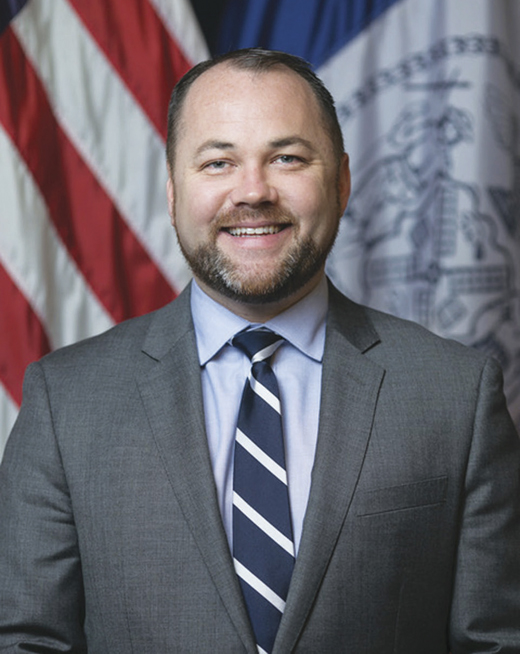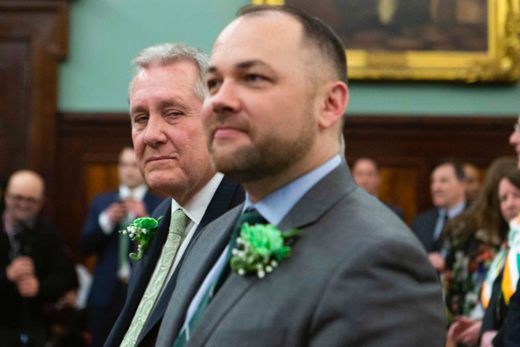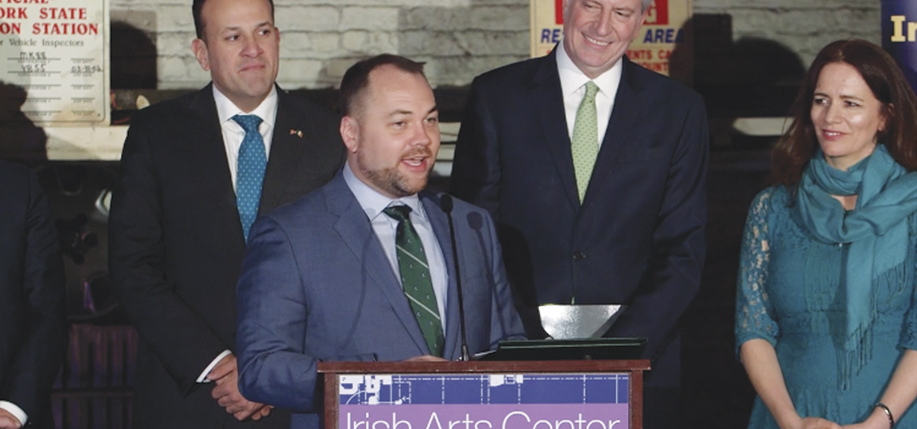Corey Johnson zoomed into New York like a comet and burst onto the political scene. In just a few short years he became speaker of the city council. He’s smart, articulate, high-energy, and the kind of guy who is going places fast. He talks to Rosemary Rogers about his history, his health, and his Irish pride.
℘℘℘
In 2013, Corey Johnson, with little money and less connections (he’s from Massachusetts), won a seat on the New York City Council. He was only 31. Five years later, the council (including its Republicans) elected him as their speaker. Corey is a man in a hurry, bringing energy and passion into every minute of his long day, making him the most charismatic politician New York has seen in a long time. This openly gay, openly HIV-positive politician is already being talked about as the next mayor of New York City.
His personal story is compelling. He was a kid from a working-class family who grew up in public housing and realized, in the sixth grade, that he was gay. He suffocated in the closet until he knew he had to come out. But that’s not easy for any high school kid, and unimaginable if, like Corey, you’re captain of your school’s football team. He turned to activists and educators for guidance and was able to tell his family. They were loving but worried for his safety – only two years earlier the torture and murder of Matthew Shepard, a young gay man, had made national headlines. He next told his grandfather, “Grandpa, I have something to tell you: I’m gay.” For Grandpa, it was a relief: “Jesus, Mary and Joseph, I thought you were going to tell me you were a Republican!”
Telling his family was liberating: “It lifted a large anvil off my shoulders.” But telling his team would be more difficult. How would they, immersed in the macho culture of jocks, react to learning their captain is gay? He stood in front them in the locker room, “I’m coming out as an openly gay man. I hope this won’t change anything.” Shock and silence filled the room until Corey broke the ice, “I didn’t come on to you in the locker room last year. I’m not going to do it this year. Who says you guys are good enough anyway?” The team broke down in laughter and were instantly on his side, and stayed there, especially during games when the opposing teams would shout gay slurs. Corey’s story made the front page of The New York Times in 2000 and included his quote, “You don’t have to do drama or be a drum major to be gay.” When Corey toured the U.S. to tell his story, he saw it resonate with many young people grappling with the same issue.
Coming out in high school made you both an inspiration and an activist. Is that how you see it?
The experience really gave me the courage to speak out and encourage others to come out as gay if they were struggling with making that decision, but mostly I learned about the importance of being brave and being yourself… I received half a million emails from people all over the world.
He moved to New York City at 19 and entered public service as an activist, first for LGBTQ+ causes and then expanding to issues like tenant advocacy. He went on to serve as chairperson of Manhattan’s Community Board 4, becoming the youngest person to chair a community board in the five boroughs. Then he learned he was HIV-positive.

When were you diagnosed as being HIV-positive?
I was 22 years old when I was diagnosed as HIV-positive. I felt shame, fear, anxiety. It was awful. I didn’t think it could get any worse. Then a couple of weeks after I seroconverted*, I lost my job, which meant I also lost my health insurance. I didn’t know where to turn. Then my doctor gave me the address of a clinic. My caseworker was loving, vibrant and reassuring. I felt zero judgment. It took me a long time to be able to talk about my diagnosis with anyone aside from my caseworker.
*Seroconversion: Once infected with HIV, the virus takes hold in the body by multiplying rapidly. The immune system responds by producing antibodies in response to the virus. Antibodies appear within one to two weeks and will continue to increase in the months after infection.
What were the years following your diagnosis like?
In the years after my diagnosis, I began to really abuse drugs and alcohol. I think I was self-medicating rather than dealing with the pain and anxiety I was feeling. But I’m proud to say that today, I am sober, I have health insurance, I am grateful and I am open about my status. I use my position to help people just like I was helped and to lessen the stigma surrounding HIV / AIDS.
This is our Health and Life Sciences Issue and I have to ask: you’re someone who exudes energy and exuberance – those splits! – making you a terrific role model for the other HIV folks out there. Has that put you on the path to being an HIV advocate?
I would not be alive today if it were not for those who came before me: Peter Staley, Ann Northrop, Vito Russo, and particularly Larry Kramer, who co-founded the Gay Men’s Health Crisis and created ACT UP. I think about those activists every day. We lost a generation of people, and we would have lost more if it weren’t for them. I am alive because of activism. I will always be grateful and live a life of service in their honor.

Sadly, HIV / AIDS is still here.
People are still dying of HIV / AIDS in 2019. For the most part, they’re black and they’re brown and they’re very poor. They don’t look like me, but I know how they feel. They’re scared and they need help. So we’ve come far, but we have far to go. I’m here to do my part and will work to save the lives of the next generation.
You recently were included in Queerly’s PRIDE 50, as was Ireland’s prime minister Leo Varadkar, also openly gay. Have you ever met or spoken with him? Any thoughts about him?
I met him at the groundbreaking ceremony for the new Irish Arts Center space in my district in Manhattan. He was very tall and very serious. We are very grateful to have his support in building an expanded state-of-the-art facility for the Irish Arts Center.
Your mother’s maiden name is Queenan. Do you have any idea what part of Ireland her family is from?
Yes, they are from Mooncoin, County Kilkenny, about 10 miles from Waterford City.
You’re part of the city council’s Irish caucus. What are those meetings like?
The Irish Caucus – there are five of us – is really active when we are planning and discussing all the wonderful Irish pride events happening throughout New York’s five boroughs for St. Patrick’s Day. That’s when our meetings become a real gabfest. We’re all pretty big personalities and so there is a lot of talking and laughter. We’re not a shy bunch. We have a good time. We are proud of our heritage and proud of all the ways New York celebrates Irish pride. ♦
_______________
Rosemary Rogers co-authored, with Sean Kelly, the best-selling humor / reference book Saints Preserve Us! Everything You Need to Know About Every Saint You’ll Ever Need (Random House, 1993), currently in its 18th international printing. The duo collaborated on four other books for Random House and calendars for Barnes & Noble. Rogers co-wrote two info / entertainment books for St. Martin’s Press. She is currently co-writing a book on empires for City Light Publishing.


Leave a Reply